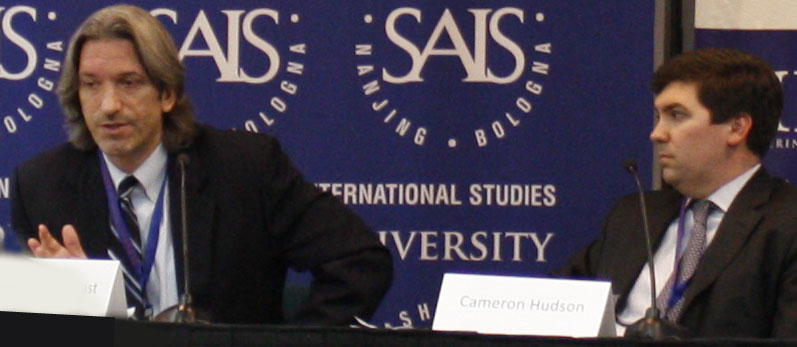
In October, the Obama administration announced the deployment of approximately 100 U.S. military personnel to Central Africa to help end the Lord’s Resistance Army, or LRA. For those who have advocated for increased efforts to put an end to Joseph Kony and his LRA’s reign of terror, the deployment was a welcomed step in the Obama administration’s implementation of its LRA strategy. However, concerns still linger about the failures of past military operations and peace processes, and the numerous efforts needed to foster peace, stability and justice in the region.
To address these concerns, Enough Project Co-Founder John Prendergast joined a panel of experts to discuss further efforts needed to end the LRA, and how to bring peace to the affected region. The panel—hosted by the International Peace and Security Institute in collaboration with The Johns Hopkins University School of Advanced International Studies—also included LRA experts Veronica Isala Eragu Bichetero, the former chief mediator between the LRA and the Government of Uganda, and Cameron Hudson, a senior advisor for the Committee on Conscience at the U.S. Holocaust Memorial Museum.
After assessing previous efforts to end the LRA leading up to the deployment, the panelists expressed optimism on the potential success of the new operation. Hudson stated that the deployment is a result of a groundswell of pressure from U.S. advocacy groups on the administration to do more about the issue. He described the differences between the current deployment and the previous military campaign against the LRA, Operation Lighting Thunder, and concluded that the current deployment is a more ambitious operation, which, “if matched by as robust diplomatic effort as the military front, has the potential for great success.”
John Prendergast echoed Hudson’s sentiment, stating, “It [the U.S. deployment] is a potential game changer if supported by other logistics.” He outlined a seven-point plan for the U.S. government and regional actors to provide more capable troops, logistical capabilities, intelligence, diplomatic efforts, DDR, civilian protection, and reconciliation and reconstruction. Prendergast explained that this is an opportune moment to bring a swift end to the LRA because we can capitalize on the newly appointed African Union special envoy for the LRA, bipartisan support in Congress, and a youth movement in the U.S., sparked by human rights groups such as Resolve, Invisible Children, and Enough.
Bichetero cautioned that while Ugandans welcome the new deployment, the U.S. should ensure that the operations are quick and effective. She encouraged all involved to examine and address the root causes of the conflict, and said that energies should focus on properly preparing for the aftermath of Kony’s potential capture. More than simply saying sorry, reconstruction in LRA-affected areas and the reconciliation of affected people is critical for regional peace, and should include more than just conventional justice. Bichetero cautioned that without these efforts, another Kony could arise.
While overall optimistic in their outlook, the panelists were also careful to consider the biggest concern for many of the audience members: the protection of civilians in the region. Prendergast emphasized the need for increased military justice efforts, as well as enhanced civilian protection training among the regional armies. He warned that there will be imperfections and limitations in the regional operations underway to end the LRA, but identifying and eliminating weaknesses early on will greatly increase the chances for success.
Photo: Enouigh Co-Founder John Prendergast and Cameron Hudson, a senior advisor for the Committee on Conscience at the U.S. Holocaust Memorial Museum, discussing the end of the LRA. (Carine Umuhumuza / Enough Project)

